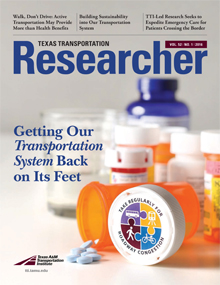
Traditionally, transportation research has focused its agenda on building the system to improve access to markets and, more recently, meet the demands of a world economy. With the highway system mostly in place, transportation research is now focusing on enhancing system performance and minimizing detrimental side effects. Some of those side effects have reached the point of becoming serious public health concerns.
Road crashes remain a major problem. In addition, the reliance on automobiles for personal transportation has resulted in less physical activity and less-active lifestyles, contributing to an increasing incidence of obesity and related diseases such as diabetes. The lack of access to medical services for non-driving population groups is a growing health care problem in many communities. Transportation’s increasing environmental footprint resulting from congestion and pollution has also added to adverse health effects. Ignoring these issues negatively impacts the economy and the quality of life in communities throughout the country. Concerted research efforts are needed to face these challenges.
In view of the importance and timeliness of the rising public health problem, the Transportation Research Board Executive Committee held a policy session on this topic in January. The purpose was to explore transportation’s effects on health and disease and identify how to make the best use of transportation to enable health improvements. Broadly identified research areas included transportation and the spread of disease, designing urban systems to promote health and safe transportation options, enhancing access to health care, improving road safety and reducing transportation’s environmental footprint.
I’ve become acquainted with the Texas A&M Transportation Institute (TTI) as a Faculty Fellow at the Texas A&M University Institute of Advanced Studies and through my work with faculty from the Zachry Department of Civil Engineering in the Dwight Look College of Engineering, as well as with TTI researchers. TTI is in a unique position to address the multidimensional issues related to public health and transportation. Effectively meeting these challenges requires the participation of researchers from various disciplines and the support of multiple federal, state, and local agencies and private organizations. The Institute is able to draw on the Texas A&M Health Science Center School of Public Health, the Texas A&M Health Science Center College of Medicine and other departments. TTI can also extend its long-standing working relationships with the Texas Department of Transportation to other agencies to create a coordinated research agenda considering infrastructure, policy, medical, social and economic issues.
Only by addressing these issues can we save lives and resources, enhance economic vitality, and improve the quality of life. This issue of the Texas Transportation Researcher presents what TTI is already doing to make a difference.

